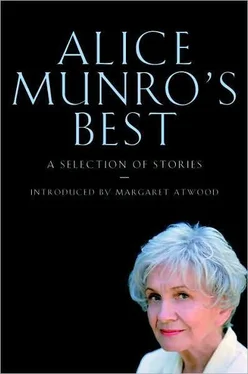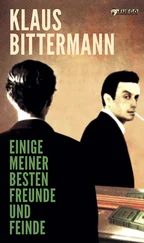“Are they always like this?” she said to Patrick. “Is it me? They don’t like me.”
“They don’t like you because I chose you,” said Patrick with some satisfaction.
They lay on the stony beach after dark, in their raincoats, hugged and kissed and uncomfortably, unsuccessfully, attempted more. Rose got seaweed stains on Dr. Henshawe’s coat. Patrick said, “You see why I need you? I need you so much!”
SHE TOOK HIM to Hanratty. It was just as bad as she had thought it would be. Flo had gone to great trouble, and cooked a meal of scalloped potatoes, turnips, big country sausages which were a special present from Billy Pope, from the butcher shop. Patrick detested coarse-textured food, and made no pretense of eating it. The table was spread with a plastic cloth, they ate under the tube of fluorescent light. The centerpiece was new and especially for the occasion. A plastic swan, lime green in color, with slits in the wings, in which were stuck folded, colored paper napkins. Billy Pope, reminded to take one, grunted, refused. Otherwise he was on dismally good behavior. Word had reached him, word had reached both Flo and Billy, of Rose’s triumph. It had come from their superiors in Hanratty; otherwise they could not have believed it. Customers in the butcher shop — formidable ladies, the dentist’s wife, the veterinarian’s wife — had said to Billy Pope that they heard Rose had picked herself up a millionaire. Rose knew Billy Pope would go back to work tomorrow with stories of the millionaire, or millionaire’s son, and that all these stories would focus on his — Billy Pope’s — forthright and unintimidated behavior in the situation.
“We just set him down and give him some sausages, don’t make no difference to us what he comes from!”
She knew Flo would have her comments too, that Patrick’s nervousness would not escape her, that she would be able to mimic his voice and his flapping hands that had knocked over the ketchup bottle. But at present they both sat hunched over the table in miserable eclipse. Rose tried to start some conversation, talking brightly, unnaturally, rather as if she was an interviewer trying to draw out a couple of simple local people. She felt ashamed on more levels than she could count. She was ashamed of the food and the swan and the plastic tablecloth; ashamed for Patrick, the gloomy snob, who made a startled grimace when Flo passed him the toothpick-holder; ashamed for Flo with her timidity and hypocrisy and pretensions; most of all ashamed for herself. She didn’t even have any way that she could talk, and sound natural. With Patrick there, she couldn’t slip back into an accent closer to Flo’s, Billy Pope’s, and Hanratty’s. That accent jarred on her ears now, anyway. It seemed to involve not just a different pronunciation but a whole different approach to talking. Talking was shouting; the words were separated and emphasized so that people could bombard each other with them. And the things people said were like lines from the most hackneyed rural comedy. Wal, if a feller took a notion to , they said. They really said that. Seeing them through Patrick’s eyes, hearing them through his ears, Rose too had to be amazed.
She was trying to get them to talk about local history, some things she thought Patrick might be interested in. Presently, Flo did begin to talk; she could only be held in so long, whatever her misgivings. The conversation took another line from anything Rose had intended.
“The line I lived on when I was just young,” Flo said, “it was the worst place ever created for suiciding.”
“A line is a concession road. In the township,” Rose said to Patrick. She had doubts about what was coming, and rightly so, for then Patrick got to hear about a man who cut his own throat, his own throat , from ear to ear; a man who shot himself the first time and didn’t do enough damage, so he loaded up and fired again and managed it; another man who hanged himself using a chain, the kind of chain you hook on a tractor with, so it was a wonder his head was not torn off.
Tore off , Flo said.
She went on to a woman who, though not a suicide, had been dead in her house a week before she was found, and that was in the summer. She asked Patrick to imagine it. All this happened, said Flo, within five miles of where she herself was born. She was presenting credentials, not trying to horrify Patrick, at least not more than was acceptable in a social way; she did not mean to disconcert him. How could he understand that?
“You were right,” said Patrick as they left Hanratty on the bus. “It is a dump. You must be glad to get away.”
Rose felt immediately that he should not have said that.
“Of course that’s not your real mother,” Patrick said. “Your real parents can’t have been like that.” Rose did not like his saying that either, though it was what she believed herself. She saw that he was trying to provide for her a more genteel background, perhaps something like the homes of his poor friends: a few books about, a tea tray, and mended linen, worn good taste; proud, tired, educated people. What a coward he was, she thought angrily, but she knew that she herself was the coward, not knowing any way to be comfortable with her own people or the kitchen or any of it. Years later she would learn how to use it, she would be able to amuse or intimidate right-thinking people at dinner parties with glimpses of her early home. At the moment she felt confusion, misery.
Nevertheless her loyalty was starting. Now that she was sure of getting away, a layer of loyalty and protectiveness was hardening around every memory she had, around the store and the town, the flat, somewhat scrubby, unremarkable countryside. She would oppose this secretly to Patrick’s views of mountains and ocean, his stone-and-timbered mansion. Her allegiances were far more proud and stubborn than his.
But it turned out he was not leaving anything behind.
PATRICK GAVE HER a diamond ring and announced that he was giving up being a historian for her sake. He was going into his father’s business.
She said she thought he hated his father’s business. He said that he could not afford to take such an attitude now that he would have a wife to support.
It seemed that Patrick’s desire to marry, even to marry Rose, had been taken by his father as a sign of sanity. Great streaks of bounty were mixed in with all the ill will in that family. His father at once offered a job in one of the stores, offered to buy them a house. Patrick was as incapable of turning down this offer as Rose was of turning down Patrick’s, and his reasons were as little mercenary as hers.
“Will we have a house like your parents’?” Rose said. She really thought it might be necessary to start off in that style.
“Well, maybe not at first. Not quite so–”
“I don’t want a house like that! I don’t want to live like that!”
“We’ll live however you like. We’ll have whatever kind of house you like.”
Provided it’s not a dump, she thought nastily.
Girls she hardly knew stopped and asked to see her ring, admired it, wished her happiness. When she went back to Hanratty for a weekend, alone this time, thank God, she met the dentist’s wife on the main street.
“Oh, Rose, isn’t it wonderful! When are you coming back again? We’re going to give a tea for you, the ladies in town all want to give a tea for you!”
This woman had never spoken to Rose, never given any sign before of knowing who she was. Paths were opening now, barriers were softening. And Rose — oh, this was the worst, this was the shame of it — Rose, instead of cutting the dentist’s wife, was blushing and skittishly flashing her diamond and saying yes, that would be a lovely idea. When people said how happy she must be she did think herself happy. It was as simple as that. She dimpled and sparkled and turned herself into a fiancée with no trouble at all. Where will you live, people said, and she said, Oh, in British Columbia! That added more magic to the tale. Is it really beautiful there, they said, is it never winter?
Читать дальше












